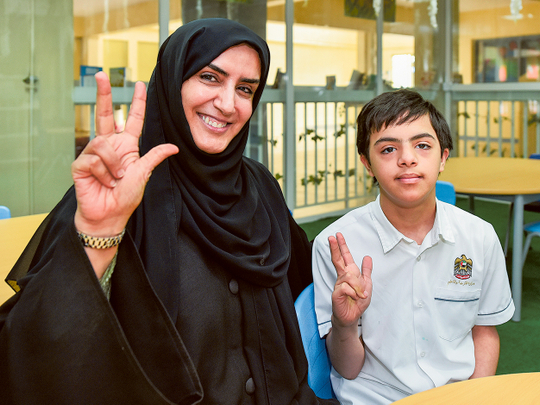
Dubai: Eleven-year-old Nasser Rashid Lootah is a stickler for time. A fifth grader in Al Nokhbah Model School for Boys in Dubai, he dislikes being late for class.
Though Nasser has Down syndrome, a condition wherein an extra genetic material causes delays in his physical and mental abilities, he studies in a mainstream school that allows him to interact with other kids his age.
His company has led to other students to be more accepting.
“Because of Nasser, the pupils are becoming more accepting. They are now more aware of students with special needs. They don’t see his condition as a disability but see him like any other pupil,” Maitha Al Merri, Nasser’s English teacher, told Gulf News.
“Nasser is quiet in general but he is well loved by the children. They love playing and interacting with him,” she added.
Nasser likes to read, especially the Quran. And when he encounters difficulty, his classmates readily help.
He does computer, science and other classes just like everyone else. But his syllabus is custom-made based on his learning needs.
“In Nasser’s case, we give him customised lessons. As per our school policy, we make it a point to include him in the classes and activities so he doesn’t feel left out,” Bushra Al Shoomi, the school principal, said.
The idea to enrol Nasser in a mainstream school and not in a special education school came from Dr Shaikha Alia Al Qasimi, Director of the Persons with Disability Department at the Community Development Authority.
“This is the best decision we’ve taken so far,” said Maha, Nasser’s mother who is proud of her son. “This is the reason for my son’s milestones — the school and the teachers.”
Maha found out about her son’s condition two days after he was born through newborn screening. She then made it a point to go regularly to Dubai Hospital and Latifa Hospital for follow-ups for Nasser’s case. But when the Dubai Early Childhood Development Centre of CDA opened, Maha enlisted her son full-time.
Initially, Maha was clueless about how to deal with her son. She said the therapists at the centre guided her.
“For example, earlier, Nasser would always stick his tongue out, or he wouldn’t talk, or he would always run away from me. The centre taught me how to solve these issues specifically,” Maha said.
Early intervention is key
Had it not been for the early intervention Nasser got when he was younger, he wouldn’t have been able to do the things he’s doing.
“The most important phase is the child’s first six years. Earlier, Nasser couldn’t talk. Now he can. He’s very different from other kids of same age and condition,” Maha said.
Maha is vehement that parents must not keep their children at home if they notice any developmental delays. “I know parents who keep their kids isolated at home for one or two years because they feel ashamed that their children have a disability. I advise them to enrol their child in early intervention centres right away.”
It starts with feeling proud about your child, no matter what, said Maha. “Be patient. Helping your child grow and achieve growth milestones takes time. But you will see [the change] eventually. It took me four years to see that in my son,” Maha said. Change, she said, doesn’t come overnight. But it does come and when it does, it’s worth it.
“Nasser is a gift from God for my family. He changed my life and my family’s as well.”








